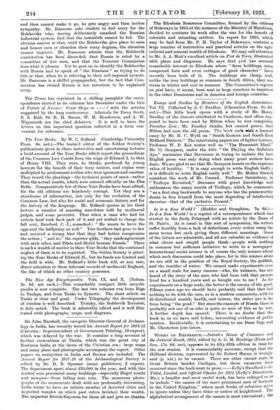The Year Books. By W. C. Bolland. (Cambridge University Press.
6s. net.)—The learned editor of the Selden Society's publications gives in these instructive and entertaining lectures a lucid account of the Year Books which report the proceedings of the Common Law Courtg from the reign of Edward L to that of Henry VIII. They were, he thinks, produced by young lawyers for the benefit of their busy seniors, and copies were multiplied by professional scribes who were ignorant and careless. They record the pleadings—the technical points of cases—rather than the actual results, which were entered officially on the Plea Rolls. Comparatively few of these Year Books have been edited, for the old editions are hopelessly corrupt. Yet they are a storehouse of information, not only for the evolution of the Common Law, but also for social and economic history and for the history of the language. Mr. Rolland quotes in his third lecture a number of amusing anecdotes told by mediaeval judges, and some proverbs. Thus when a man who had let certain land took back part of it and yet wished to charge the full rent, Bereford, C. J., remarked : " He wants to have the eggs and the halfpenny as well." Two brothers had gone to law and received a strong hint that they had better compromise the action ; " and so," the reporter adds, "they madeagreement with each other, and Pilate and Herod became friends." There is such a wealth of matter in these Year Books that the continued neglect of them is to be regretted. The Selden Society is print- ing the Year Books of Edward IL, but its funds are limited and the field is wide. Mr. Bolland's little book will, at any rate, direct attention to these informal records of mediaeval England, the like of which no other country possesses.


































 Previous page
Previous page